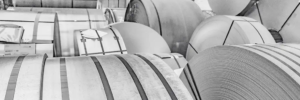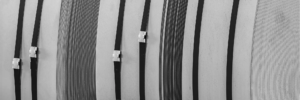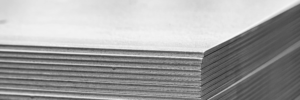| Quality | Standard | Possible coatings |
|---|---|---|
| CR340LA | VDA 239-100 | UC, EG, GI, GA, AS, ZM |
| Testing direction | Yield Point Re (MPa) | Tensil Strength Rm (MPa) | Elongation type 1 A50 (in %) | Type 2 A80 (in %) | Type 3 A50 (in %) | n10-20/Ag |
|---|---|---|---|---|---|---|
| L | 340 – 430 | 410 – 530 | ≥ 22 | ≥ 21 | ≥ 23 | ≥ 0,10 |
| C % | Si % | Mn % | P % | S % | Al % | Ti % | Nb % | Cu % |
|---|---|---|---|---|---|---|---|---|
| ≤ 0,12 | ≤ 0,50 | ≤ 1,50 | ≤ 0,030 | ≤ 0,025 | ≥ 0,015 | ≤ 0,15 | ≤ 0,09 | ≤ 0,20 |
The automotive industry is subject to constant change, driven by ever stricter requirements for vehicle safety, weight reduction and environmental protection. Innovative materials are essential to meet these challenges. The VDA standard 239-100, published by the German Association of the Automotive Industry, defines a range of cold-rolled thin sheets that have been specially developed for use in car body structures and other safety-relevant components. Grade CR340LA occupies a key position within this standard. It is a micro-alloyed, high-strength steel that is given its outstanding properties through a specific chemical composition and special thermomechanical processing. Unlike conventional steels, CR340LA offers a superior combination of strength and formability, making it an indispensable material for the construction of modern, lightweight and safe car bodies. Its application is limited exclusively to the automotive industry, where its specifications and performance characteristics are fully utilized.
Properties
The mechanical and chemical properties of CR340LA are the result of precise coordination. The minimum mechanical requirements set out in the VDA 239-100 standard define tensile strength (Rm), yield strength (Rp0.2) and elongation at break (A80) as key parameters. For CR340LA, the minimum yield strength is 340 MPa, while the tensile strength must be at least 410 MPa. At the same time, a considerable minimum elongation at break of 21 % is required. This combination of high strength and good elongation makes it possible to produce complex geometries using cold forming processes such as deep drawing or roll forming without damaging the workpieces.
The chemical composition plays an equally decisive role. The steel has a very low carbon content, which significantly improves weldability and minimizes the formation of brittle martensite phases in the heat-affected zone (HAZ). The high strength is not achieved through an increased carbon content, but through the targeted addition of micro-alloying elements such as niobium (Nb), titanium (Ti) or vanadium (V). These elements form fine carbides or carbonitrides, which strengthen the grain boundaries and promote a fine-grained microstructure. The result is a steel that not only has high strength, but also offers excellent weldability and formability, which increases production efficiency. Furthermore, the surface of the cold-rolled strip is ideal for further processing, for example for hot-dip galvanizing or other coating processes.
Applications
Due to its balanced properties, CR340LA is used specifically for a variety of safety and weight-relevant components in the automotive body. Typical areas of application include:
By using CR340LA, car manufacturers can produce components with a thinner wall thickness, which leads to a significant reduction in weight. This lightweight design contributes directly to reducing fuel consumption and CO2 emissions.
Conclusion
CR340LA in accordance with VDA 239-100 is more than just a cold-rolled steel – it is a strategic material for the automotive industry. Its outstanding combination of high strength, good formability and excellent weldability makes it a first-class choice for engineers developing components with demanding safety and efficiency requirements. It enables the construction of lighter, more stable and crash-proof vehicle structures that meet strict legal requirements and high consumer expectations. For engineers and technicians looking for innovative solutions in the field of vehicle bodywork, CR340LA is a reliable and future-proof material solution that makes a significant contribution to the further development of automotive engineering.
Delivery Forms

Ihr Ansprechpartner
Alex Bachmann
+49 2841/60041 120
+49 173/7545333
Alex.Bachmann@ESB-Group.com






